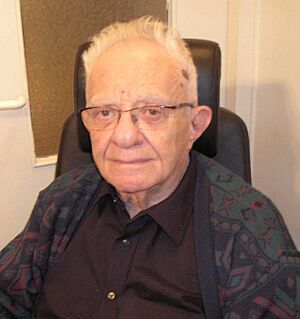Shmuel Eisenstadt facts for kids
Shmuel Noah Eisenstadt (born September 10, 1923, in Warsaw; died September 2, 2010, in Jerusalem) was an important Israeli sociologist and writer. A sociologist studies how societies work, how people interact, and how cultures change. In 1959, he started teaching in the sociology department at the Hebrew University in Jerusalem. He became a professor emeritus in 1990, meaning he retired but kept his title. Eisenstadt taught at many famous universities around the world, like Harvard University and Stanford. He also won several major awards, including the Balzan prize and the Holberg International Memorial Prize. He was a member of many important groups, like the American Academy of Arts and Sciences.
Eisenstadt became well-known for studying young people and how different generations interact. He also helped people understand that societies around the world develop in many different ways. Before his work, some thought that all societies would follow the same path as Europe. But Eisenstadt showed that while Europe started many trends, other places like Japan or the USA developed in their own unique ways, even when becoming modern.
Early Life and Learning
Shmuel Eisenstadt was born in 1923 in Warsaw, which was then part of Poland. When he was young, his mother moved with him to Jerusalem. He grew up and went to school in Palestine from the age of 12. In 1940, he began studying at the Hebrew University. There, he earned his M.A. and Ph.D. in sociology. After finishing his studies, he became an assistant teacher in Martin Buber's department in Jerusalem. Eisenstadt stayed at the Hebrew University for his whole career. He led the Department of Sociology for many years, from 1950 to 1969. He also served as the Dean of the Faculty of Humanities for a while.
Understanding Societies and Change
Eisenstadt helped us understand different cultures and civilizations. He studied how cultures and social structures change over time. He looked at the tensions and different paths societies take, rather than thinking they all follow one simple path. Eisenstadt researched big ideas like social change, what it means to be modern, and how different civilizations work. One of his interesting ideas was that "fundamentalism" (a very strict way of following old rules or beliefs) is actually a modern thing, not just something from the past.
He explained his main goal as trying to understand the history of great civilizations. He wanted to see how these societies changed, how they became modern, and how they developed different ways of being "modern." To honor his work, his former students and colleagues wrote a book called Comparative Social Dynamics. This book explored the main ideas Eisenstadt studied, such as cultures, modernization, and social and political change.
Awards and Recognition
Shmuel Eisenstadt received many important awards for his work. These awards showed how much his ideas helped people understand society better.
- In 1964, he won the McIver Prize from the American Sociological Association.
- He received the Rothschild Prize in Social Sciences in 1970.
- In 1973, he was given the Israel Prize in social sciences, which is one of Israel's highest honors.
- He won the International Balzan Prize in 1988.
- In 1994, he received the Max Planck Award for Social Sciences.
- He was given the Holberg International Memorial Prize in 2006 by the Norwegian Parliament. This prize is for excellent scholarly work in many fields, including social sciences.
Eisenstadt was also a member of many important groups, like the Israeli Academy of Sciences. He was an honorary member of the American Philosophical Society and the National Academy of Sciences in the U.S. He was also an honorary fellow at the London School of Economics. In 2010, a special book was published in his honor, called Collective Identities, States and Globalization.
See also
- List of Israel Prize recipients
 | Frances Mary Albrier |
 | Whitney Young |
 | Muhammad Ali |


